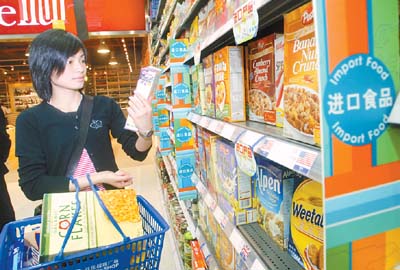
Imported milk, wine and fruit are increasingly popular among Shenzhen consumers as food safety concerns affect what they buy, with retailers and online stores increasingly focusing on selling imported food.
Customs statistics showed that roughly 260 Shenzhen companies imported food worth US$433 million between January and November through Wenjindu Checkpoint, which handles usually about half of food imports in the city.
Imports in the first 11 months showed an increase of 13 percent from a year ago. Import numbers for December, which have not been released yet, are expected to be very high as imports in the last two months of the year usually make up more than half of the year’s total.
Walmart, the world’s largest retailer, said it has prepared itself for the Spring Festival shopping season by introducing a wider range of imported food to its 26 stores in Shenzhen. Imported milk, wine and fruit have been among the most popular commodities at its outlets, with imported fruit selling 10 times more than last year. Imported wine sales jumped by 60 percent, according to the retailer’s China headquarters in Shenzhen.
“This milk has been among the top three most imported foodstuffs for the year,” said Zhou Zhaoyao, manager of Walmart’s Shekou store, pointing at milk imported from Britain.
A slew of food safety scandals have pushed Chinese consumers to opt for overseas brands. Many retailers in Shenzhen have set aside a section of their stores exclusively for imported food, while cross-border e-commerce food sales boomed last year, especially in the free trade zone of Qianhai.
Dozens of cross-border e-commerce companies were set up in Shenzhen and their sales last year increased by more than 130 percent from a year ago, according to Hong Peilin, a deputy director with the Shenzhen E-Commerce Service Center.
City Wish, which opened in September, is a brick-and-mortar store covering 70,000 square meters in Yantian District. It saw sales of more than 20 million yuan (US$3.17 million) in its first month of operation, according to deputy manager Zhou Xuegen.
It claims to be the cross-border e-commerce firm with the largest brick-and-mortar store and offers more than 10,000 imported goods.
Haidaowang.com, a leading e-commerce company which opened a store in Qianhai in March and another store in the Futian FTZ in April to focus on cross-border trade, receives a daily average of 8,000 visitors at its real stores and monthly sales have been growing at 50 percent, said Manager Ni Jun.
Liverpool Import and Export (Shenzhen) Co., a dominant food importer at this year’s Spring Festival Shopping Fair, said its average daily sales have been around 6,000 yuan since the fair opened Jan. 19.
“Snacks like chocolate and [cookies] are among the most popular. We joined similar fairs last year, but sales were not as good as this year,” said Deng Tao, the purchasing manager at the firm.
Traditional retailers also set up cross-border e-commerce branches to fight for a slice of the market. China Resources Vanguard opened a real store of its Ewj Shop brand, which mainly sells goods from Hong Kong, in July in Qianhai. The two high-end supermarket brands under the retailer, Ole and Blt.
Both saw sales grow quickly last year, according to PR manager Xiao Ping. Up to 80 percent of goods at Ole are imported. At Blt, up to 60 percent of its goods are imported.
Blt recently opened its third store in Shenzhen in Huangqiangbei and plans to open seven new stores this year.
French retailer Carrefour also said imported milk is among its most popular products. Japanese retailer Aeon, where imported foods are mainly from Japan, said its sales of imported food rose by nearly 10 percent.
“Young people are the main force of Shenzhen consumers who care more about food safety and have a high recognition of overseas brands,” said Zhang Huijun, CEO of Shenzhen-based pinwine.com, the largest online to offline wine dealer in China.